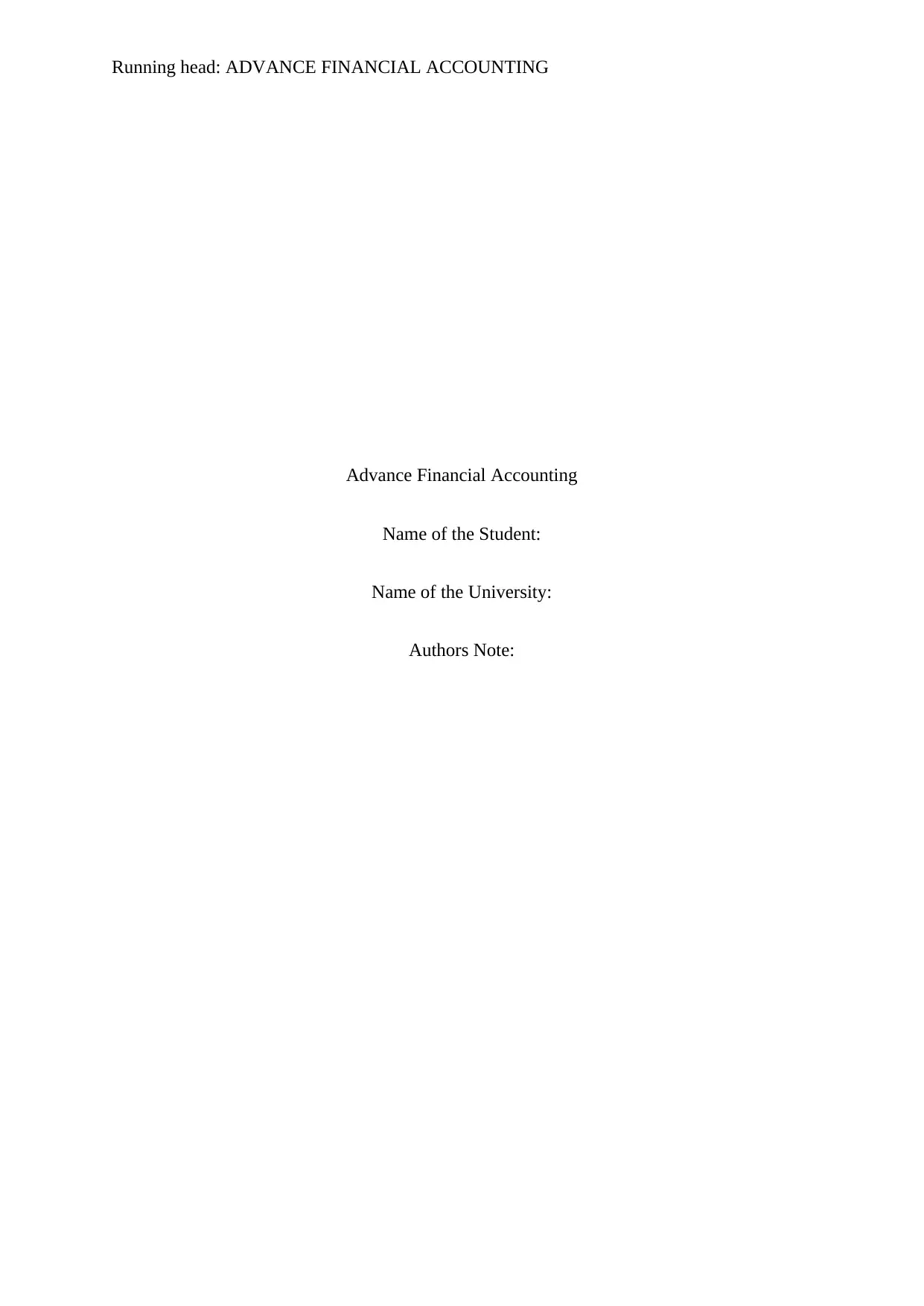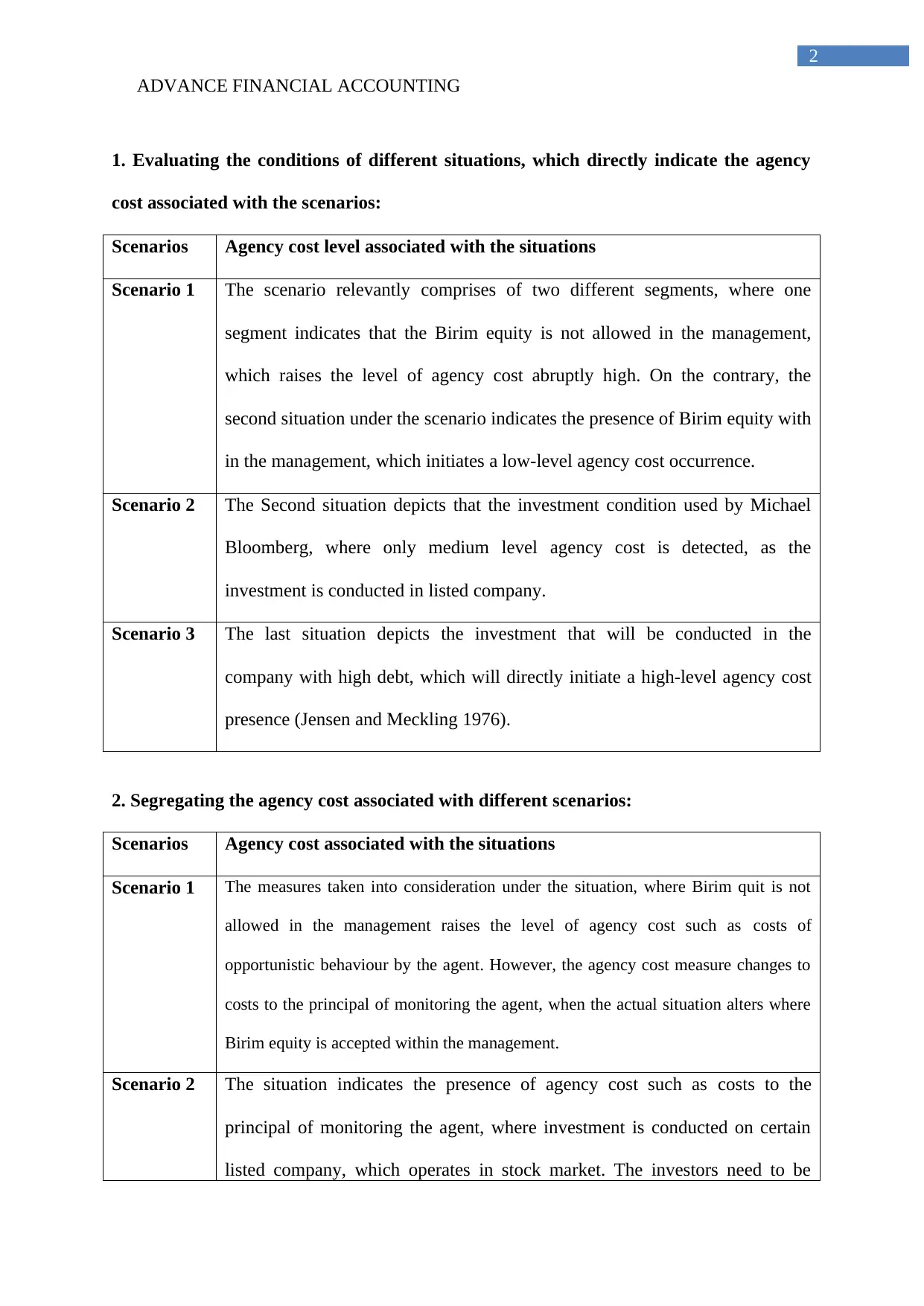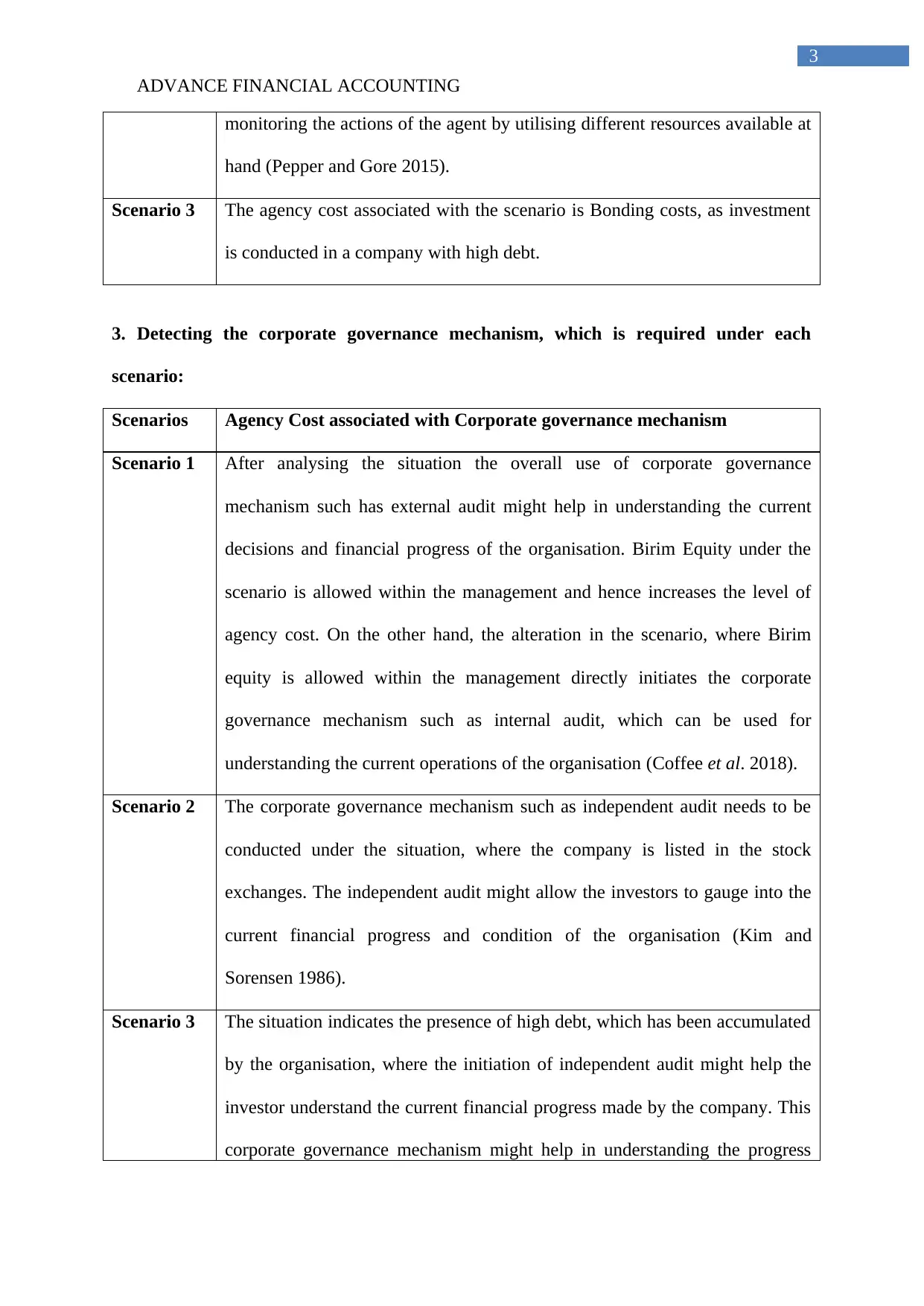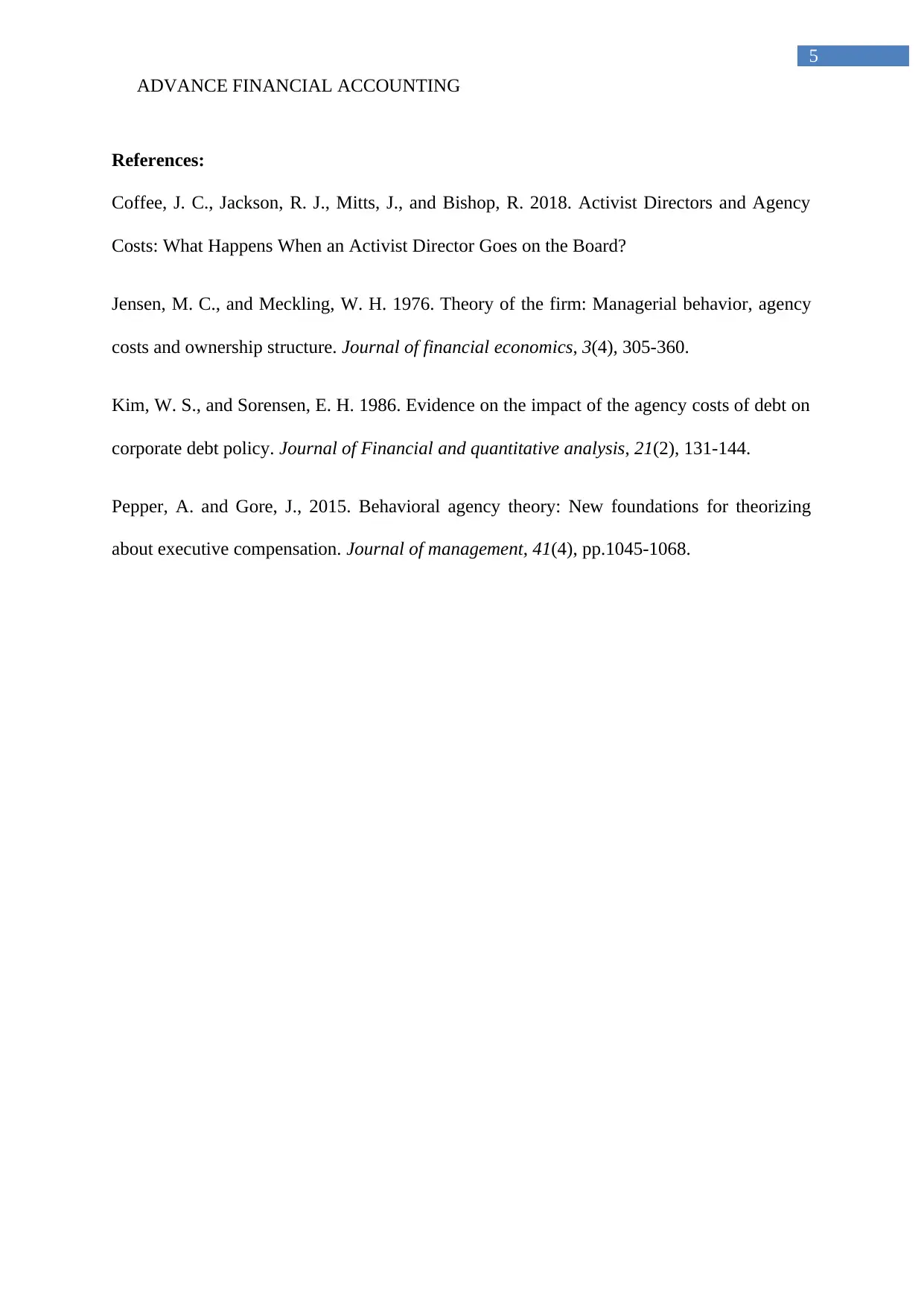Agency Cost Analysis in Advance Financial Accounting Report
VerifiedAdded on 2023/06/06
|6
|827
|156
Report
AI Summary
This report provides an analysis of agency costs within the context of advance financial accounting. It evaluates different scenarios, including the presence or absence of Birim equity in management, investment strategies, and the impact of high debt levels. The report segregates agency costs associated with each scenario, such as costs of opportunistic behavior, monitoring costs, and bonding costs. Furthermore, it identifies the appropriate corporate governance mechanisms required under each scenario, including external, internal, and independent audits, to mitigate agency problems and ensure financial progress and sound management decisions. The report references key literature on agency theory and corporate governance, providing a comprehensive overview of the topic.

Running head: ADVANCE FINANCIAL ACCOUNTING
Advance Financial Accounting
Name of the Student:
Name of the University:
Authors Note:
Advance Financial Accounting
Name of the Student:
Name of the University:
Authors Note:
Paraphrase This Document
Need a fresh take? Get an instant paraphrase of this document with our AI Paraphraser

ADVANCE FINANCIAL ACCOUNTING
1
Table of Contents
1. Evaluating the conditions of different situations, which directly indicate the agency cost
associated with the scenarios:....................................................................................................2
2. Segregating the agency cost associated with different scenarios:..........................................2
3. Detecting the corporate governance mechanism, which is required under each scenario:....3
References:.................................................................................................................................5
1
Table of Contents
1. Evaluating the conditions of different situations, which directly indicate the agency cost
associated with the scenarios:....................................................................................................2
2. Segregating the agency cost associated with different scenarios:..........................................2
3. Detecting the corporate governance mechanism, which is required under each scenario:....3
References:.................................................................................................................................5

ADVANCE FINANCIAL ACCOUNTING
2
1. Evaluating the conditions of different situations, which directly indicate the agency
cost associated with the scenarios:
Scenarios Agency cost level associated with the situations
Scenario 1 The scenario relevantly comprises of two different segments, where one
segment indicates that the Birim equity is not allowed in the management,
which raises the level of agency cost abruptly high. On the contrary, the
second situation under the scenario indicates the presence of Birim equity with
in the management, which initiates a low-level agency cost occurrence.
Scenario 2 The Second situation depicts that the investment condition used by Michael
Bloomberg, where only medium level agency cost is detected, as the
investment is conducted in listed company.
Scenario 3 The last situation depicts the investment that will be conducted in the
company with high debt, which will directly initiate a high-level agency cost
presence (Jensen and Meckling 1976).
2. Segregating the agency cost associated with different scenarios:
Scenarios Agency cost associated with the situations
Scenario 1 The measures taken into consideration under the situation, where Birim quit is not
allowed in the management raises the level of agency cost such as costs of
opportunistic behaviour by the agent. However, the agency cost measure changes to
costs to the principal of monitoring the agent, when the actual situation alters where
Birim equity is accepted within the management.
Scenario 2 The situation indicates the presence of agency cost such as costs to the
principal of monitoring the agent, where investment is conducted on certain
listed company, which operates in stock market. The investors need to be
2
1. Evaluating the conditions of different situations, which directly indicate the agency
cost associated with the scenarios:
Scenarios Agency cost level associated with the situations
Scenario 1 The scenario relevantly comprises of two different segments, where one
segment indicates that the Birim equity is not allowed in the management,
which raises the level of agency cost abruptly high. On the contrary, the
second situation under the scenario indicates the presence of Birim equity with
in the management, which initiates a low-level agency cost occurrence.
Scenario 2 The Second situation depicts that the investment condition used by Michael
Bloomberg, where only medium level agency cost is detected, as the
investment is conducted in listed company.
Scenario 3 The last situation depicts the investment that will be conducted in the
company with high debt, which will directly initiate a high-level agency cost
presence (Jensen and Meckling 1976).
2. Segregating the agency cost associated with different scenarios:
Scenarios Agency cost associated with the situations
Scenario 1 The measures taken into consideration under the situation, where Birim quit is not
allowed in the management raises the level of agency cost such as costs of
opportunistic behaviour by the agent. However, the agency cost measure changes to
costs to the principal of monitoring the agent, when the actual situation alters where
Birim equity is accepted within the management.
Scenario 2 The situation indicates the presence of agency cost such as costs to the
principal of monitoring the agent, where investment is conducted on certain
listed company, which operates in stock market. The investors need to be
⊘ This is a preview!⊘
Do you want full access?
Subscribe today to unlock all pages.

Trusted by 1+ million students worldwide

ADVANCE FINANCIAL ACCOUNTING
3
monitoring the actions of the agent by utilising different resources available at
hand (Pepper and Gore 2015).
Scenario 3 The agency cost associated with the scenario is Bonding costs, as investment
is conducted in a company with high debt.
3. Detecting the corporate governance mechanism, which is required under each
scenario:
Scenarios Agency Cost associated with Corporate governance mechanism
Scenario 1 After analysing the situation the overall use of corporate governance
mechanism such has external audit might help in understanding the current
decisions and financial progress of the organisation. Birim Equity under the
scenario is allowed within the management and hence increases the level of
agency cost. On the other hand, the alteration in the scenario, where Birim
equity is allowed within the management directly initiates the corporate
governance mechanism such as internal audit, which can be used for
understanding the current operations of the organisation (Coffee et al. 2018).
Scenario 2 The corporate governance mechanism such as independent audit needs to be
conducted under the situation, where the company is listed in the stock
exchanges. The independent audit might allow the investors to gauge into the
current financial progress and condition of the organisation (Kim and
Sorensen 1986).
Scenario 3 The situation indicates the presence of high debt, which has been accumulated
by the organisation, where the initiation of independent audit might help the
investor understand the current financial progress made by the company. This
corporate governance mechanism might help in understanding the progress
3
monitoring the actions of the agent by utilising different resources available at
hand (Pepper and Gore 2015).
Scenario 3 The agency cost associated with the scenario is Bonding costs, as investment
is conducted in a company with high debt.
3. Detecting the corporate governance mechanism, which is required under each
scenario:
Scenarios Agency Cost associated with Corporate governance mechanism
Scenario 1 After analysing the situation the overall use of corporate governance
mechanism such has external audit might help in understanding the current
decisions and financial progress of the organisation. Birim Equity under the
scenario is allowed within the management and hence increases the level of
agency cost. On the other hand, the alteration in the scenario, where Birim
equity is allowed within the management directly initiates the corporate
governance mechanism such as internal audit, which can be used for
understanding the current operations of the organisation (Coffee et al. 2018).
Scenario 2 The corporate governance mechanism such as independent audit needs to be
conducted under the situation, where the company is listed in the stock
exchanges. The independent audit might allow the investors to gauge into the
current financial progress and condition of the organisation (Kim and
Sorensen 1986).
Scenario 3 The situation indicates the presence of high debt, which has been accumulated
by the organisation, where the initiation of independent audit might help the
investor understand the current financial progress made by the company. This
corporate governance mechanism might help in understanding the progress
Paraphrase This Document
Need a fresh take? Get an instant paraphrase of this document with our AI Paraphraser

ADVANCE FINANCIAL ACCOUNTING
4
and the management’s decisions, which are being made for securing the
growth of the organisation.
4
and the management’s decisions, which are being made for securing the
growth of the organisation.

ADVANCE FINANCIAL ACCOUNTING
5
References:
Coffee, J. C., Jackson, R. J., Mitts, J., and Bishop, R. 2018. Activist Directors and Agency
Costs: What Happens When an Activist Director Goes on the Board?
Jensen, M. C., and Meckling, W. H. 1976. Theory of the firm: Managerial behavior, agency
costs and ownership structure. Journal of financial economics, 3(4), 305-360.
Kim, W. S., and Sorensen, E. H. 1986. Evidence on the impact of the agency costs of debt on
corporate debt policy. Journal of Financial and quantitative analysis, 21(2), 131-144.
Pepper, A. and Gore, J., 2015. Behavioral agency theory: New foundations for theorizing
about executive compensation. Journal of management, 41(4), pp.1045-1068.
5
References:
Coffee, J. C., Jackson, R. J., Mitts, J., and Bishop, R. 2018. Activist Directors and Agency
Costs: What Happens When an Activist Director Goes on the Board?
Jensen, M. C., and Meckling, W. H. 1976. Theory of the firm: Managerial behavior, agency
costs and ownership structure. Journal of financial economics, 3(4), 305-360.
Kim, W. S., and Sorensen, E. H. 1986. Evidence on the impact of the agency costs of debt on
corporate debt policy. Journal of Financial and quantitative analysis, 21(2), 131-144.
Pepper, A. and Gore, J., 2015. Behavioral agency theory: New foundations for theorizing
about executive compensation. Journal of management, 41(4), pp.1045-1068.
⊘ This is a preview!⊘
Do you want full access?
Subscribe today to unlock all pages.

Trusted by 1+ million students worldwide
1 out of 6
Related Documents
Your All-in-One AI-Powered Toolkit for Academic Success.
+13062052269
info@desklib.com
Available 24*7 on WhatsApp / Email
![[object Object]](/_next/static/media/star-bottom.7253800d.svg)
Unlock your academic potential
Copyright © 2020–2025 A2Z Services. All Rights Reserved. Developed and managed by ZUCOL.




